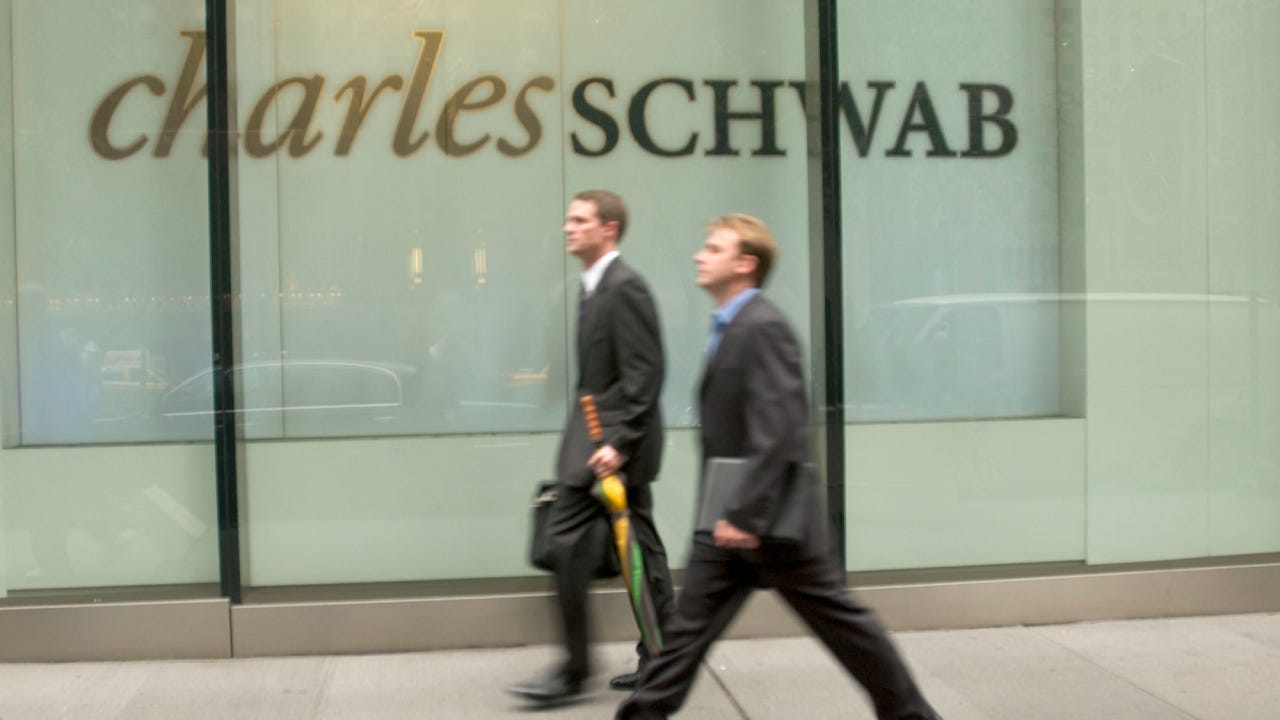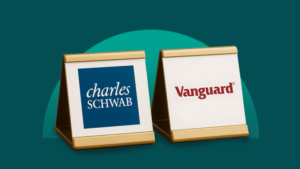Charles Schwab vs. Robinhood: Which is better for you?

Charles Schwab and Robinhood are two of the most popular online brokerages, letting clients buy and sell stock, options, exchange-traded funds and more. Millions of people trust these names to help them access the market, track investments and research stocks, among other things.
Charles Schwab has a long-deserved reputation as an investor-friendly broker that helps smaller investors, using a range of research and tools. It regularly ranks highly in Bankrate’s reviews of the industry’s best.
But Robinhood has taken the investment community by storm in the last decade, quickly growing into the name that many think of when they think of mobile trading. It’s been a boon for many investors due to its support for fractional shares and low trading costs, especially for options.
So which is better for you? That comes down to the broker’s features but also what you really need from one. Here’s how they stack up on the most important features.
| Broker Category | Charles Schwab | Robinhood |
|---|---|---|
| Stock and ETF commissions | $0 | $0 |
| Options commissions | 65 cents per contract | $0 per contract |
| Account minimum | $0 | $0 |
| Tradable securities | Stocks, ETFs, bonds, mutual funds, options, futures, forex | Stocks, ETFs, options, cryptocurrency |
| Account fees | $50 full transfer-out fee; $0 for partial | $100 transfer-out fee (full or partial) |
| No-transaction-fee mutual funds | ~4,000 | None |
| Account types | Individual and joint taxable, IRAs, small business (SEP IRA, solo 401(k), etc.), managed portfolio, custodial, charitable and trust, among others | Individual and joint taxable accounts, IRAs (traditional, Roth and rollover) |
| Mobile app | Schwab mobile app and thinkorswim app on the Apple App Store and Google Play Store | Mobile app on the Apple App Store and Google Play Store |
| Fractional shares | Stock slices – for purchases and dividend reinvestment | Yes, for purchases and dividend reinvestment |
| Customer support | 24/7 phone, chat and email, more than 400 branches | Email, chatbot and 24/7 call-back |
Schwab vs. Robinhood: Costs
In several areas on the cost front, it’s a dead heat, but Schwab edges out its rival overall.
Both Schwab and Robinhood offer trading in stocks and ETFs with no commission, but so does every other major online broker. Robinhood stands out for its no-cost options trading, a rarity in the sector and something that an options trader may find especially worthwhile. Schwab can’t match it, and instead offers the industry standard commission of 65 cents per contract.
That said, Schwab offers something that Robinhood doesn’t — some 4,000 mutual funds without a transaction fee. That’s a solid offering, as Robinhood doesn’t offer mutual funds at all.
And when it comes to other fees, Schwab notches ahead again. It charges a $50 full transfer-out fee if you’re moving securities and $0 for a partial move, compared to Robinhood’s $100 for a full or partial transfer.
Edge: Schwab
Schwab vs. Robinhood: Account minimum
With neither account having a minimum balance requirement, it’s easy for any investor to get started with either broker. No account minimum is a feature of the best brokers for beginners.
Edge: Even
Schwab vs. Robinhood: Tradable securities
Here’s a place where Charles Schwab outdistances Robinhood due to the breadth of its offerings, even though Robinhood offers something Schwab doesn’t.
At Schwab, you can trade a number of different securities, including stocks, bonds, options, ETFs, mutual funds, futures and forex. It’s a wide selection that offers investors a ton of access to the most popular investment types, enough that virtually all investors are going to be satisfied.
Robinhood still offers a solid core of available investments — stocks, ETFs and options — but not other popular types such as mutual funds. The differentiating factor is that it offers trading in cryptocurrency alongside its other securities, something that most traditional brokers don’t.
So if you want a wider selection of securities, Schwab makes the better pick, while if you want the core with the addition of crypto, then Robinhood is your winner.
Edge: Schwab, for its wider selection of traditional securities
Schwab vs. Robinhood: Account types
In terms of account types, there’s still some distance between Schwab and Robinhood, though Robinhood has narrowed the gap in recent years.
Schwab offers all the fundamental types — individual and joint taxable accounts, IRAs (traditional, Roth and rollover), custodial accounts, business accounts and trust accounts, among other less typical types. If you’re looking for a managed portfolio, Schwab offers that through its Schwab Intelligent Portfolios robo-advisor service at no additional fee. It’s quite a range.
In contrast, Robinhood offers individual and joint taxable accounts as well as IRAs (traditional, Roth and rollover). It also just rolled out its own managed portfolio service as well: Robinhood Strategies. The broker actually has a neat bonus feature for its IRAs, giving you a 1 percent bonus of whatever money you bring to the table, including for rollovers. If you’re a member of Robinhood Gold, you’ll get a 3 percent bonus.
If you want to do more with your broker than what Robinhood offers, you’ll need to go elsewhere.
Edge: Schwab
Schwab vs. Robinhood: Fractional shares
When it comes to fractional shares, Robinhood clearly outclasses Schwab.
Robinhood is an excellent pick if you’re intending to invest in fractional shares. You can not only place orders for fractional shares, but you can also reinvest any dividends in partial shares, too. That combination is not something you see at many brokerages, only the best for fractional shares. At Robinhood, you can buy partial shares for as little as $1, and the range of available stock is huge — all but the smallest stocks and those trading for less than $1 — to keep the riff-raff out.
You can buy fractional shares as part of Schwab’s Stock Slices program, but its range of supported stocks is narrower — just the 500 or so names in the S&P 500 index. You’ll need to invest at least $5 for each purchase, and you can buy up to 30 stocks at a single time, making it a fairly easy-to-use interface if you want to buy a lot of stocks at once (in contrast to Fidelity’s interface.) However, you’ll be able to reinvest your dividends for other stocks that pay them.
So Schwab’s fractional share program is decently broad, but not nearly as broad as Robinhood’s.
Edge: Robinhood
Schwab vs. Robinhood: Customer support
Schwab’s customer service is one of its strongest suits, and it really is that good.
Schwab regularly receives high marks for its helpful and friendly customer support. You can get to a human in under a minute without getting lost in the telephone maze. Schwab has 24/7 support across phone, chat and email, plus you can still go to one of 400+ branches. In our experience, it’s been as good as you could reasonably expect customer support to be.
Robinhood has recently upgraded its support, moving from what used to be essentially a self-help page, email support and a deeply buried phone number. Now you’ll get those plus 24/7 callback support for your issue. Just leave information about your concern and Robinhood will get back to you within 24 hours. It now also offers 24-hour chat support, too. It’s worlds better than it had been, surely, but Schwab tops this game. Of course, as an app, Robinhood doesn’t offer a branch network if you have that pressing question.
Edge: Schwab
Who is Charles Schwab best for?
- Schwab works as a great all-around broker for investors who are looking for research, education and strong customer support.
- Schwab’s trading platform, the well-regarded thinkorswim, may prove particularly valuable to traders or those who simply prefer it.
- Investors who are looking to expand their accounts in future years, perhaps with IRAs, 529 plans or even a robo-advisor account, have solid options here.
Who is Robinhood best for?
- Robinhood will work well for those who like the mobile-first experience and prefer the ease of a quick swipe to trade and research stocks.
- If fractional shares are what you’re looking for, Robinhood offers among the best programs around.
- Free options trading is still uncommon, and if you’re doing significant trading, then you may be able to save significant money at Robinhood.
Bottom line
Given that it’s an upstart with pockets not nearly as deep as its rival’s, Robinhood does a surprisingly good job in a handful of categories, compared to the well-funded and deeply experienced Charles Schwab. But Schwab ends up being too polished in too many categories, and it takes an investor-friendly approach to so much of what it does. Still, those looking for a specific feature such as free options trading may find Robinhood a more apt choice.
Why we ask for feedback Your feedback helps us improve our content and services. It takes less than a minute to complete.
Your responses are anonymous and will only be used for improving our website.





